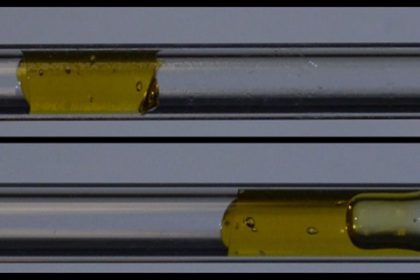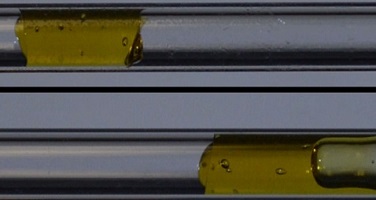
An MIT research team that has already conquered the problem of getting ketchup out of its bottle has now tackled a new category of consumer and manufacturing woe: how to get much thicker materials to slide without sticking or deforming.
Based on a news that MIT news published, the slippery coatings the team has developed, called liquid-impregnated surfaces, could have numerous advantages, including eliminating production waste that results from material that sticks to the insides of processing equipment. They might also improve the quality of products ranging from bread to pharmaceuticals, and even improve the efficiency of flow batteries, a rapidly developing technology that could help to foster renewable energy by providing inexpensive storage for generated electricity.
These surfaces are based on principles initially developed to help foods, cosmetics, and other viscous liquids slide out of their containers, as devised by Kripa Varanasi (Right image), a professor of mechanical engineering at MIT, along with former students Leonid Rapoport PhD ’18 and Brian Solomon PhD ’16. The new work is described today in the journal ACS Applied Materials and Interfaces.
Like the earlier surfaces they developed, which led to the creation of a spinoff company called LiquiGlide, the new surfaces are based on a combination of a specially textured surface and a liquid lubricant that coats the surface and remains trapped in place through capillary action and other intermolecular forces associated with such interfaces. The new paper explains the fundamental design principles that can achieve almost 100 percent friction reduction for these gel-like fluids.
Needing a squeeze
Such materials, known as yield-stress fluids, including gels and pastes, are ubiquitous. They can be found in consumer products such as food, condiments, and cosmetics, and in products in the energy and pharmaceuticals industries. Unlike other fluids such as water and oils, these materials will not start to flow on their own, even when their container is turned upside down. Starting the flow requires an input of energy, such as squeezing the container.
But that squeezing has its own effects. For example, bread-making machinery typically includes scrapers that constantly push the sticky dough away from the sides of its container, but that constant scraping can result in over-kneading and a denser loaf. A slippery container that requires no scraping could thus produce better-tasting bread, Varanasi says. By using this system, “beyond getting everything out of the container, you now add higher quality” of the resulting product.
That may not be critical where bread is concerned, but it can have great impact on pharmaceuticals, he says. The use of mechanical scrapers to propel drug materials through mixing tanks and pipes can interfere with the effectiveness of the medicine, because the shear forces involved can damage the proteins and other active compounds in the drug.

Top Image: gel-like yield stress fluid, top, moves as a plug without shearing in a tube with the new surface coating. At bottom, the same fluid is seen shearing while it flows in an uncoated tube, where part of the fluid gets stuck to the tube while part of it continues to flow.
For more information please read: Source
Edited by: Samaneh Marjani
************************
Why Should Be “A Paid-Subscriber” and “Advertiser”
Keeping an independent media in countries that impose limitations on self supporting media, will help to support the humankind’s freedom. If you believe it, please act to be a PRO-MEMBER by clicking “HERE“, or:
Please send your PR’s directly to the email address of the Chief-Editor in order to be published at once in the world via ” http://pimi.ir ” The address is: aasaatnia@live.com.














